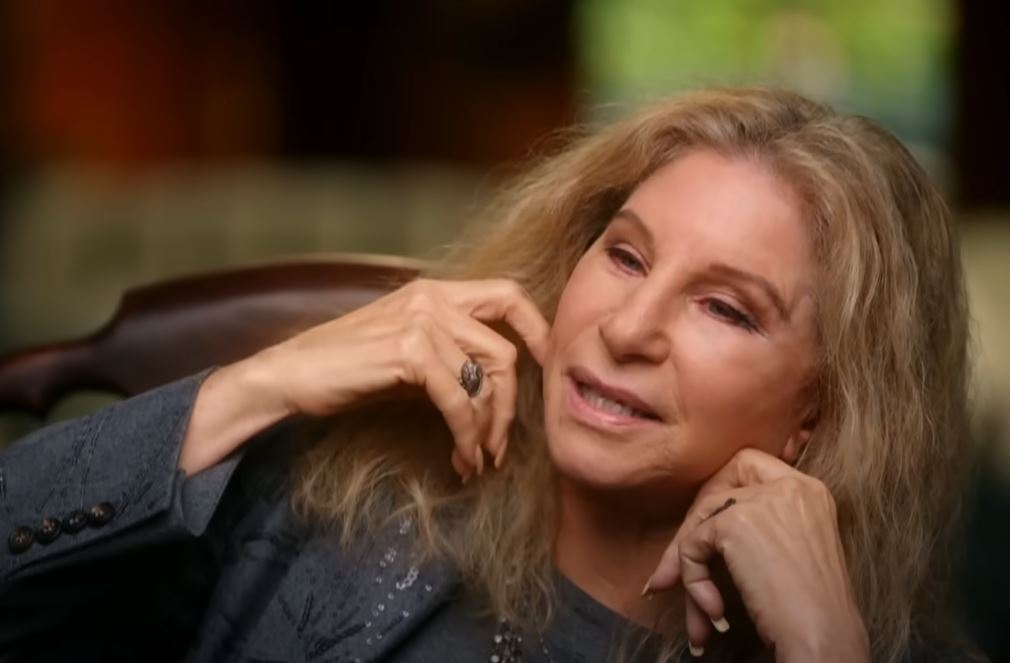
Credit: The Late Show with Stephen Colbert
Awards abound in Barbra Streisand’s career, but her personal life has frequently been influenced by health issues that have deepened her artistic vision. Similar to Adele’s acknowledged fear of performing live, stage fright was not merely a transient anxiety but rather a persistent problem. She was scarred for decades by the Central Park incident, in which she infamously forgot lyrics in front of thousands of people. What may have seemed insignificant to others was incredibly successful in changing her decisions, preventing her from going on tours during her prime, but ironically, it increased her mystique.
Her reported agoraphobia, which makes her cautious of public settings where she might lose control, added to her anxiety. This was a paradoxical irony for someone who thrived on attention, but it also demonstrated her humanity. By admitting these weaknesses, Streisand started a dialogue that celebrities had long shunned. Younger artists especially benefited from it, as they witnessed that even a performer of her caliber battled fears that were remarkably similar to their own.
| Category | Details |
|---|---|
| Full Name | Barbara Joan “Barbra” Streisand |
| Born | April 24, 1942, New York City, U.S. |
| Nationality | American |
| Occupation | Singer, Actress, Director, Producer, Songwriter |
| Net Worth | Estimated $400 million+ |
| Major Health Issues | Stage fright, anxiety, agoraphobia, pre-diabetes, heart disease risk |
| Advocacy | Women’s Heart Alliance co-founder, Barbra Streisand Women’s Heart Center at Cedars-Sinai |
| Awards | 2 Oscars, 10 Grammys, 5 Emmys, 9 Golden Globes, Presidential Medal of Freedom |
| Family | Married to James Brolin, one son Jason Gould |
Her physical well-being was an additional factor. Later years of rising blood pressure and pre-diabetic markers served as a wake-up call, reminding her that discipline was necessary for longevity. She responded by committing to a healthier diet and regular training with a personal coach she has had for decades, which significantly improved her lifestyle. This change was blatant evidence that even icons have to change to meet the needs of the times.
However, the topic that characterized her later years was the health of women’s hearts. Dr. Bernadine Healy’s term “Yentl Syndrome,” which described how women who suffered heart attacks frequently received worse care than men, startled Streisand. In 2014, she and Ronald Perelman co-founded the Women’s Heart Alliance, turning her concern into activism. She became an unrelenting advocate as a result, helping to raise millions of dollars and guaranteeing that gender-specific research gained traction. Her skill at fusing advocacy and celebrity has been extremely effective in changing the public’s perception of heart disease as a problem that affects both men and women.
Her dedication was further demonstrated by Cedars-Sinai’s Barbra Streisand Women’s Heart Center, which has carried out ground-breaking studies on the cardiovascular health of women. Her legacy is as deeply ingrained in medicine as it is in music thanks to this remarkably resilient contribution. She has emphasized prevention in recent years by appearing on shows like Dr. Oz, educating women about the signs of cardiac distress, which include fatigue, jaw pain, and nausea. This guidance has proven to be incredibly successful in reaching audiences that conventional campaigns frequently overlook.
Her advocacy is similar to how Lady Gaga highlighted mental health following personal struggles or how Angelina Jolie talked candidly about making preventive health decisions. In addition to raising awareness, Streisand’s readiness to combine her personal suffering with her public mission has greatly lessened the stigma associated with talking about such topics. She has reminded women that knowledge itself can save lives and that one in three of them die from heart disease, which kills more of them than all cancers combined.
Resilience is also evident in her health journey. Streisand’s longevity is evidence of her ability to adapt gracefully, as she continues to perform with vitality at the age of 83. She makes fun of her passion for food while eating a heart-healthy diet that includes fruits, vegetables, and occasionally plant-based proteins. Her fans have found her advice on striking a balance between indulgence and discipline to be surprisingly affordable, demonstrating that moderation rather than perfection is sustainable.
It is impossible to overstate the influence her advocacy has had on society. She made sure that research funding started to address inequalities in hospital treatment of women by using her celebrity to her advantage. Women’s heart health is now a national concern as a result of her campaigns, which have inspired cooperation from local communities and legislators. Similar to how campaigns for breast cancer awareness once changed the conversation around public health, this collective mobilization has been especially creative.
Her experience demonstrates how strength can come from vulnerability. She learned courage from the stage fright that kept her quiet. The pre-diabetic panic became a catalyst for healthier lifestyle choices. Her quest for reform was sparked by the gender inequality she found in medicine. Despite being personal, Barbra Streisand’s health issues have been turned into public advocacy with very clear objectives: equity, awareness, and prevention.
Her advocacy demonstrates that her voice, which has always been powerful in song, has an equally strong resonance in the field of health. She encourages women to speak up for themselves, to ask questions, and to not allow their symptoms to be dismissed. That message is about empowerment in general, not just medicine. Her health journey has demonstrated, in many ways, that greatness is not just about performance but also about the capacity to use one’s own struggles as a springboard for more significant change.

